
views
X
Research source
Luckily, there are many ways to soothe the bite using either household products or over-the-counter medications. With proper care, the bite will soon be nothing more than an annoying memory.
Home Remedies
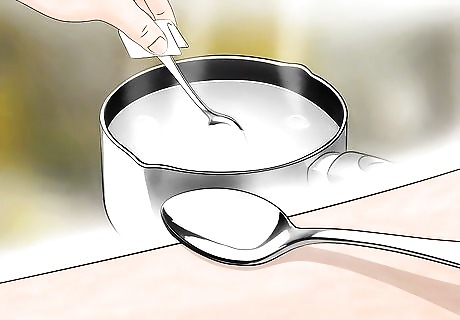
Apply heat to the bite for quick relief. A little bit of soothing heat can distract you from the itching of a mosquito bite. Heat a spoon in hot water. It should be very hot, but not so hot that you burn yourself. Touch the back of the spoon to the bite and slowly press down. Hold it there for 3-5 seconds, or until you feel relief from the itching. Be careful not to burn yourself. If the spoon feels uncomfortably hot, let it cool for a bit. It’s not clear how this works, but heat may block the typical itching that happens when your body releases histamines (a chemical that’s part of your natural immune response).
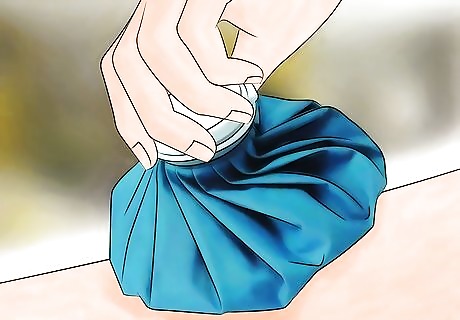
Numb the bite with an ice pack. The cold will reduce the swelling and numb the nerves. Wrap the ice pack in a thin towel to protect your skin, then hold it on the bite for 15-20 minutes. Take the ice pack off and let your skin warm up again. Packages of frozen corn or peas make handy ready-to-use ice packs.
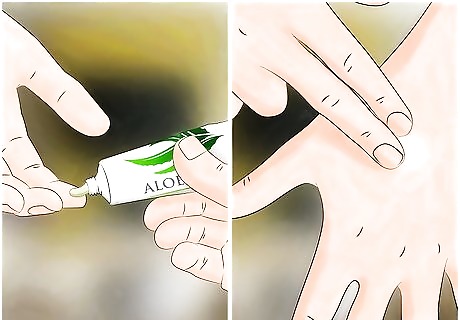
Apply aloe to the bite to reduce inflammation. Smooth 100% aloe vera gel on your bite and gently massage it in. If the bite is hot and itchy from being scratched, the aloe will be cool and soothing. It’s also anti-inflammatory, so it should take down some of the swelling and promote healing. It helps keep the skin moisturized, too! For the best results, use a 100% pure aloe vera gel. You can also use raw aloe from a plant in your house. Split open a leaf and rub the gooey gel directly onto your skin.
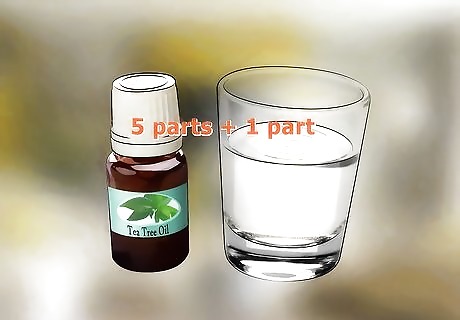
Try essential oils, such as tea tree oil. These methods have not been scientifically tested, but anecdotal evidence suggests that some essential oils may help relieve itching. Try applying a little tea tree oil, which has antibacterial and anti-inflammatory properties, directly to the bite. Dilute a few drops of the oil in a carrier oil and gently massage it in with your finger or a cotton ball. It might help soothe your itching and prevent an infection. To prevent skin irritation, always dilute essential oils in a carrier oil, such as almond, jojoba, or avocado oil. Mix 3 drops of essential oil into 1 teaspoon (4.9 mL) of the carrier oil. Try other oils, like lavender or coconut. They smell good and will help soothe your frustration with the itching.
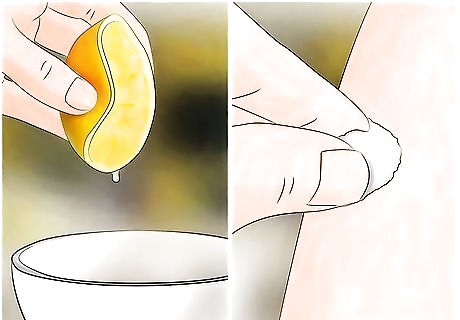
Apply acidic juices or vinegar to soothe the itching. There’s not much scientific evidence that this works, but a lot of people swear by lemon juice or other mild acids as a soothing remedy for itchy bites. Rub a little lemon juice or white vinegar on the bite, using either your fingers or a cotton ball. Steer clear of this method if your skin is broken or irritated. Lemon juice or vinegar will really sting if it gets into any nicks or scratches! Stay out of the sun if using citrus juice on the skin as it can cause painful phytophotodermatitis.
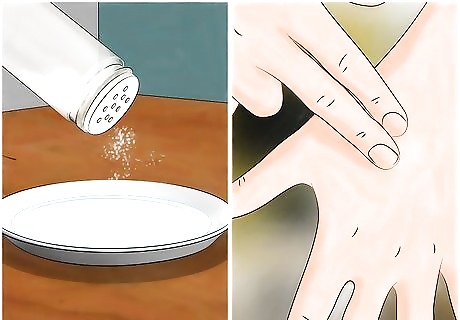
Use meat tenderizer to reduce the itching. Mix a small amount of water with the meat tenderizer, using just enough that the tenderizer dissolves and makes a paste. Rub the paste onto the bite and leave it there for about 10-15 minutes, then rinse it away. You should feel relief within a few seconds! This will help reduce the itching by breaking down the proteins that were injected into your skin with the mosquito's saliva.
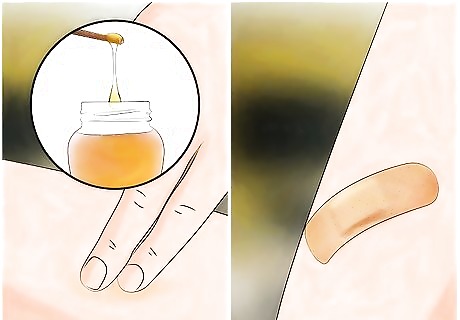
Try raw honey to soothe inflammation. Honey has anti-inflammatory properties and the stickiness will make it less enjoyable to scratch. Plus, its natural antibacterial properties can help prevent an infection! Smear a dab of raw, organic honey on the bite, and leave it there. Cover the bite with a bandage to prevent dirt from sticking to the honey and getting into the bite.
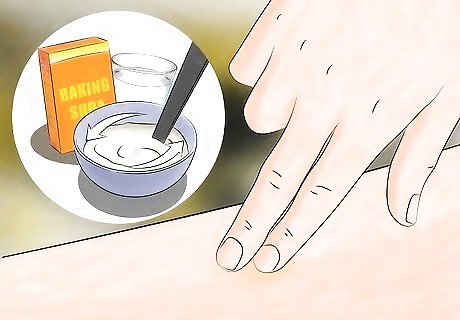
Use a baking soda paste a few times a day. Mix a stiff paste from baking soda and water. Start with a 2:1 ratio of baking soda and water and add baking soda as needed until the paste is moist, but not runny. Put a generous dollop onto the bite and let it dry. Do this as often as you need to get relief. You can also try a baking soda-based toothpaste. Baking soda may help neutralize the acidity of the mosquito’s saliva and reduce irritation.
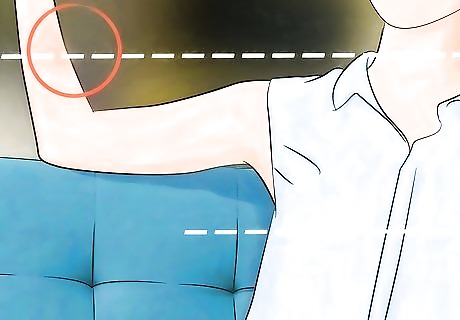
Raise the bite above your heart to reduce extreme swelling. Mosquito bites don’t usually cause major swelling. But, if you’re experiencing a lot of inflammation, elevating the bite might help. If the bite occurred on your arm or leg, raise the limb above your heart to help it drain. For example, if you have a bite on your leg, lie down on a couch and prop your leg up on the arm or a throw pillow. Maintain this posture for 30 minutes to give the swelling time to go down.
Over the Counter Medications
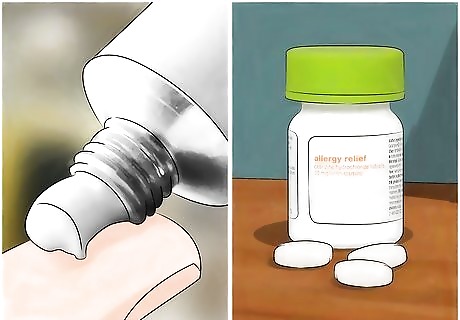
Take an antihistamine to reduce your body's allergic reaction to the bite. Mosquito bites trigger a mild allergic reaction, which is what causes the itching and swelling. Take an oral antihistamine, such as diphenhydramine (Benedryl) or cetirizine (Zyrtec), to calm the inflammation. Oral antihistamines can make you drowsy, so try a topical antihistamine cream instead if you need to stay awake.
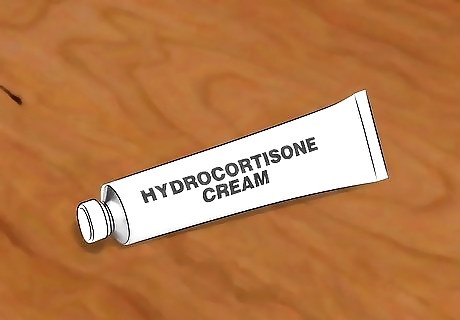
Try a hydrocortisone cream. Look for a cream with a concentration of 0.5%-1%. Rub it into the itchy, red, puffy skin. It may take a few minutes, but you should get relief. 0.5%-1% hydrocortisone creams can be purchased without a prescription. Because this is a steroid cream, consult your doctor before applying it to children.
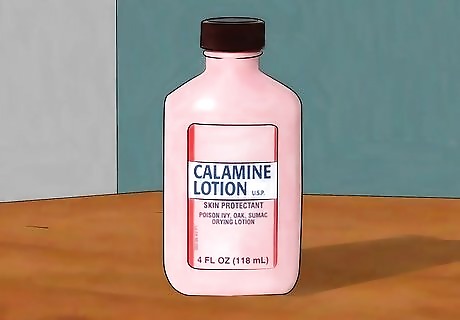
Apply calamine lotion. It’s not clear why calamine lotion works the way it does, but it’s great for relieving itching and irritation. Rub a little onto the bite to soothe the itching. You can also use it to dry out an infected bite and promote quicker healing. Reapply the lotion as needed, but not more often than described in the manufacturer's instructions.
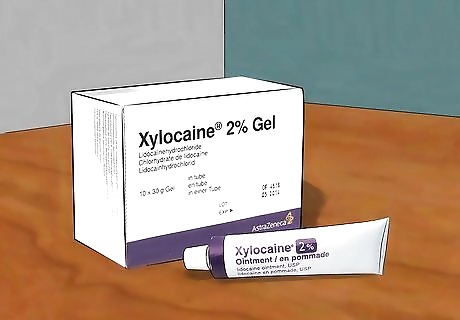
Use pain-relieving medications as necessary. Pain relievers are generally unnecessary for mosquito bites, but if you have scratched it open it may sting and be painful. Try an over-the-counter painkiller, like acetaminophen (Tylenol) or ibuprofen (Motrin). You can also try a topical pain relief gel or cream, such as lidocaine. Mosquito bites aren’t usually painful. If you’re experiencing a lot of pain, talk to your doctor.
When to See a Doctor
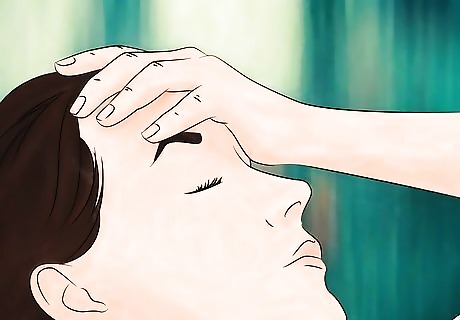
Seek medical attention if you become ill after being bitten. Some mosquitoes carry serious diseases, and when they bite, they transfer the virus or parasite into your body through their saliva. See a doctor if you develop any of the following symptoms: Fever Headache Dizziness Joint and muscle aches Vomiting
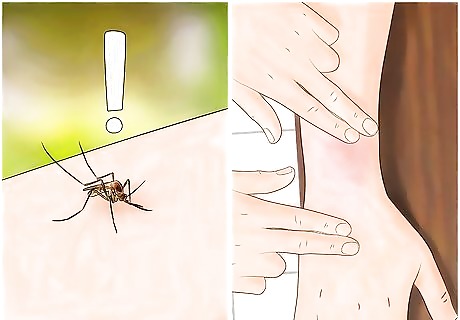
Tell your doctor if you were bitten by mosquitoes while traveling. Some mosquito-borne diseases are more common in certain parts of the world. If you’ve gotten sick after traveling and suspect it’s because of a mosquito bite, tell your doctor. This may help them narrow down their diagnosis. Malaria and yellow fever occur mostly in the tropics. West Nile and encephalitis viruses are transmitted by mosquitoes in the U.S. Dengue Fever is uncommon, but does occur in the southern US.
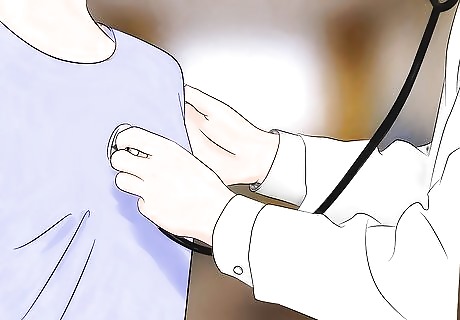
Call a doctor immediately if you develop a systemic allergic reaction. This is an unusual response to a mosquito bite, but it if occurs, it must be addressed quickly. Symptoms include: Difficulty breathing or wheezing Difficulty swallowing Dizziness Vomiting Racing heart Hives or rashes spreading beyond the site of the bite Itching or swelling in other parts of your body besides where you were bitten Your doctor may prescribe oral glucocorticoids to avoid a large-scale allergic reaction.
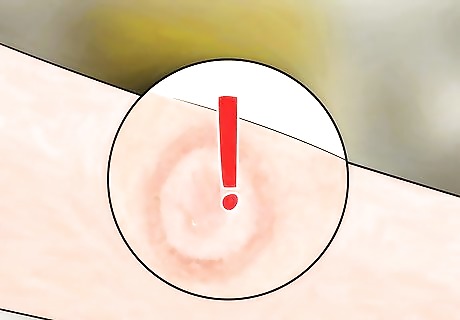
Watch for painful swelling. Sometimes people develop an allergic reaction to the proteins in mosquito saliva. This reaction causes itchy, painful redness and swelling known as "skeeter syndrome." See your doctor if you have severe swelling at the bite site. You're more likely to develop skeeter syndrome if you're bitten frequently, as you can become sensitized to the saliva. There's no test for skeeter syndrome. If you see red, itchy, painful swelling, see your doctor for treatment.
Prevention
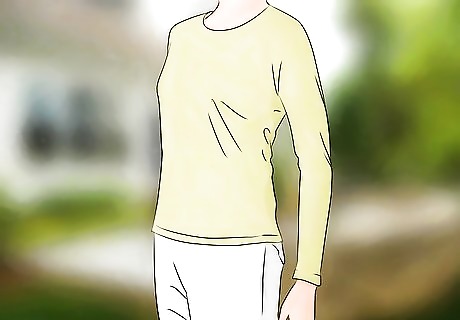
Wear long pants and long sleeves to cover your skin. Put on protective clothes to reduce the amount of skin available to bite. This may make you a less attractive target. Though mosquitoes do bite through clothing, it should reduce the number of bites you get.
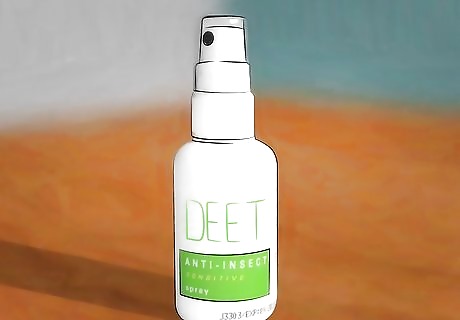
Use bug repellents on exposed skin and clothing. Spray a mosquito repellent containing DEET, picaridin, or oil of lemon eucalyptus (OLE) all over your clothes and any exposed areas of your skin, such as your neck and hands. You can also spray it on your hands and then pat it onto your face and hair. The most effective repellants contain DEET (N, N-diethylmeta-toluamide) or picaridin, and these are widely available in most drugstores. Take care not to inhale the repellant or get it in your eyes or open wounds. EPA-approved insect repellents, like those containing DEET or picaridin, are considered safe for children and for pregnant or breastfeeding mothers. However, if you have any concerns, talk to your doctor. Shower to wash the spray off your skin when you no longer need it.
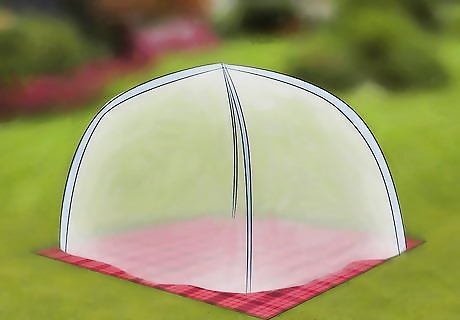
Sleep under a mosquito net if there are no screens on the windows. This will prevent you from getting bitten while you sleep. Tuck the net under the mattress so that you leave no openings for mosquitoes to fly through. Check the net frequently and repair any holes. You can also purchase a personal mosquito tent that you can place directly on top of your bed.
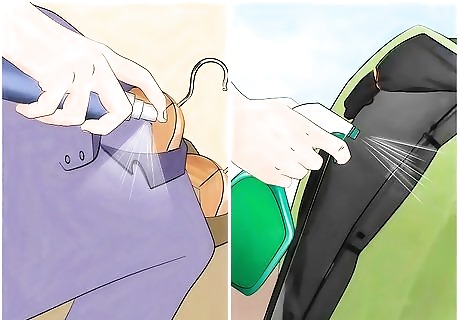
Use permethrin on clothing, bed nets, and camping gear. Spray the permethrin onto your clothing or gear in a well-ventilated area, then let it dry. This protection should last about 2 weeks, or through 2 washings. Don’t leave your permethrin treated clothes, bed nets, or gear out in the sun, since the UV light will break down the permethrin faster. Consult a doctor if you are pregnant or before applying it to the clothing of young children.
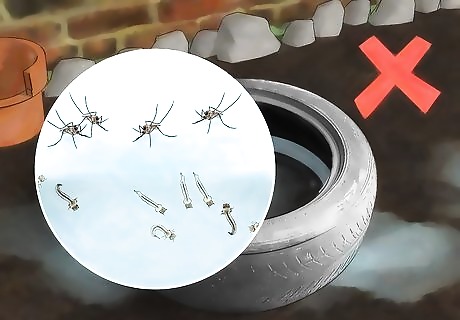
Don't leave pools of standing water near your home. Mosquitoes breed in standing water, so emptying pools and puddles will reduce the mosquito population. Check around your home and yard frequently, and turn over and wash out any containers or other items that might collect rainwater, such as flower pots, kiddie pools, or bird baths. Change the water in your pet's drinking bowl frequently.


















Comments
0 comment